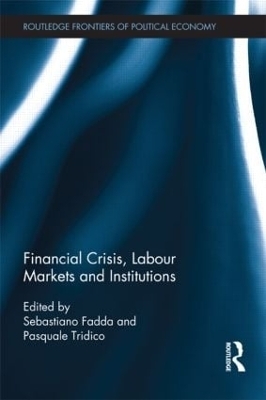
Financial Crisis, Labour Markets and Institutions
Routledge (Verlag)
978-1-138-90182-7 (ISBN)
The volume makes these points through the exploration of several key questions:
What kind of institutional political economy is appropriate to explain crisis periods and failures of crisis-management?
Are different varieties of capitalism more or less crisis-prone, and can the global financial crisis can be attributed to one variety more than others?
What is the interaction between the labour market and the financialization process?
The book argues that each variety of capitalism has its own specific crisis tendencies, and that the uneven global character of the crisis is related to the current forms of integration of the world market. More specifically, the 2007-09 economic crisis is rooted in the uneven income distribution and inequality caused by the current financial-led model of growth.
The book explains how the introduction of more flexibility in the labour markets and financial deregulation affected everything from wages to job security to trade union influence. Uneven income distribution and inequality weakened aggregate demand and brought about structural deficiencies in aggregate demand and supply. It is argued that the process of financialization has profoundly changed how capitalist economies operate. The volume posits that financial globalization has given rise to growing international imbalances, which have allowed two growth models to emerge: a debt-led consumption growth model and an export-led growth model. Both should be understood as reactions to the lack of effective demand due to the polarization of income distribution.
Sebastiano Fadda is Professor of Labour Economics and Economic Growth at the University of Roma Tre, Italy. He is also Director of the ASTRIL Research Centre at the University of Roma Tre. Pasquale Tridico is Professor of Labour Economics at the University of Roma Tre, Italy, and Research Associate at Trinity College Dublin, Ireland. He is currently General Secretary of the European Association for Evolutionary Political Economy.
Introduction Sebastiano Fadda and Pasquale Tridico Part I: Capitalism in Crisis: Nature and Origins 1. Capitalism in Deep Trouble Richard Wolff 2. The North Atlantic Financial Crisis and Varieties of Capitalism: A Minsky moment and/or a Marx moment? And perhaps Max Weber too? Bob Jessop 3. Beyond the Political Economy of Hyman Minsky: What financial innovation means today Anastasia Nesvetailova 4. The Problematic Nature of the Economic and Monetary Union Malcolm Sawyer 5. Financialization, Income Distribution and the Crisis Engelbert Stockhammer Part II: Impact and Consequences of the Crisis 6. Labour Market Institutions and the Crisis: Where we come from and where we are going Sebastiano Fadda 7. Financial Crisis, Labour Markets and Varieties Of Capitalism: A comparison between the European social model versus the US model Pasquale Tridico 8. Labour Market Rigidities Can Be Useful: A Schumpeterian view Alfred Kleinknecht, C.W.M. Naastepad, Servaas Storm and Robert Vergeer 9. The Unemployment Impact of Financial Crises Enrico Marelli and Marcello Signorelli
| Reihe/Serie | Routledge Frontiers of Political Economy |
|---|---|
| Zusatzinfo | 29 Tables, black and white; 29 Line drawings, black and white; 29 Illustrations, black and white |
| Verlagsort | London |
| Sprache | englisch |
| Maße | 156 x 234 mm |
| Gewicht | 340 g |
| Themenwelt | Sozialwissenschaften ► Politik / Verwaltung ► Staat / Verwaltung |
| Wirtschaft ► Betriebswirtschaft / Management ► Finanzierung | |
| Wirtschaft ► Betriebswirtschaft / Management ► Rechnungswesen / Bilanzen | |
| Wirtschaft ► Volkswirtschaftslehre ► Finanzwissenschaft | |
| Wirtschaft ► Volkswirtschaftslehre ► Makroökonomie | |
| Wirtschaft ► Volkswirtschaftslehre ► Mikroökonomie | |
| Wirtschaft ► Volkswirtschaftslehre ► Wirtschaftspolitik | |
| ISBN-10 | 1-138-90182-2 / 1138901822 |
| ISBN-13 | 978-1-138-90182-7 / 9781138901827 |
| Zustand | Neuware |
| Informationen gemäß Produktsicherheitsverordnung (GPSR) | |
| Haben Sie eine Frage zum Produkt? |
aus dem Bereich


